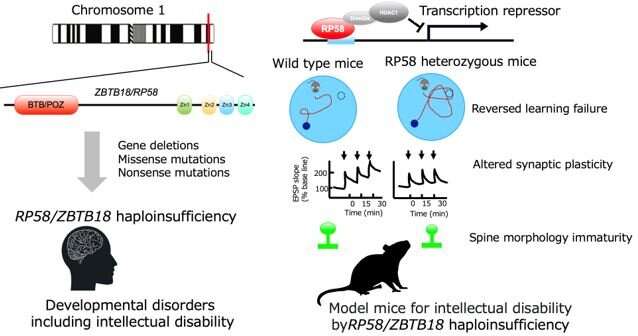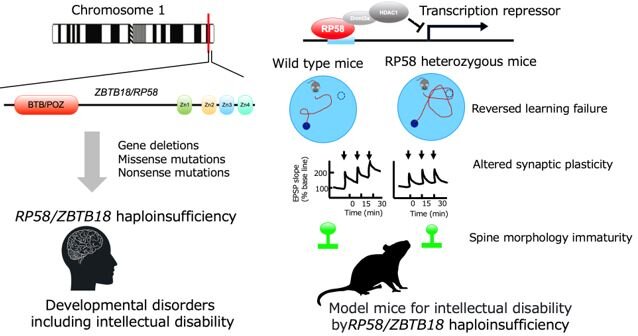
In this study published in Molecular Psychiatry, researchers generated and analyzed Rp58 heterozygous mice as a model of RP58/ZBTB18 haploinsufficiency and were able to clarify the following four points.
1) Histological analysis of the brain of this model mouse showed no significant abnormality in the formation of the cortical layers, but it did show dysplasia of the corpus callosum. This is an abnormality that has also been reported in patients with RP58/ZBTB18 haploinsufficiency.
2) This mouse model showed impairment of motor learning, working memory, and cognitive memory flexibility. These phenotypes are similar to the symptoms of intellectual disability.
3) Decreased expression of glutamate receptors was found in the cerebral cortex of the above mice. In addition, the response of NMDA receptors in hippocampal CA1 neurons was abnormal, and the saturation level of synaptic long-term potentiation was reduced after repeated frequent stimulation. These indicate abnormalities in glutamate receptor synaptic responses, which play an important role in memory and learning functions.
4) Furthermore, morphological analysis of the hippocampal CA1 pyramidal cell spine revealed maturation defects in mature-type spines. These results suggest that excitatory synaptic defects exist in the background of RP58/ZBTB18 haploinsufficiency, and they are expected to be useful in the development of prevention and treatment methods for intellectual disabilities caused by RP58/ZBTB18 haploinsufficiency.
Social significance and future prospects
It has been demonstrated that insufficient expression of Rp58 causes cognitive decline, and it has been suggested that one of the causes of this cognitive decline is dysfunction of excitatory synapses of excitatory neurons. This is expected to provide clues for the development of methods to prevent and treat cognitive dysfunction in patients with RP58/ZBTB18 haploinsufficiency.
However, the mechanism by which reduced Rp58 expression causes synaptic dysfunction is unknown. It is hoped that the identification of the target gene of RP58 will elucidate the mechanism, and this mouse model will be useful in this regard.
More information:
Sayaka Hirai et al, The mouse model of intellectual disability by ZBTB18/RP58 haploinsufficiency shows cognitive dysfunction with synaptic impairment, Molecular Psychiatry (2023). DOI: 10.1038/s41380-023-01941-3
Journal information:
Molecular Psychiatry
Source: Read Full Article
